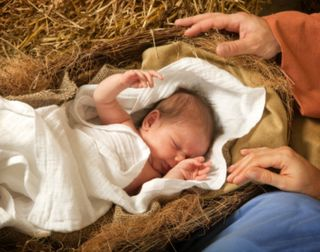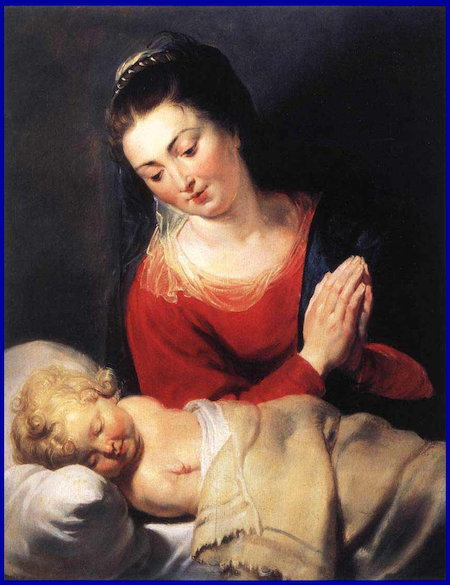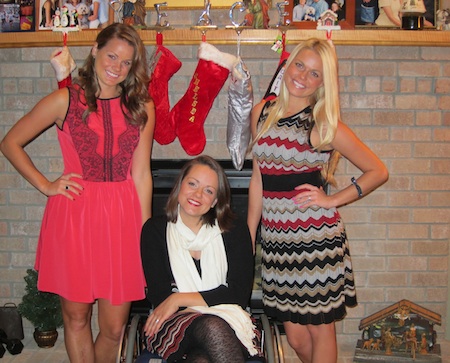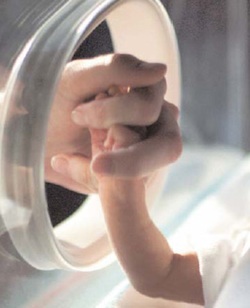Time for some baby cuteness up in here.
Recently my grandparents sent us a box of old pictures, which included several cute baby pics of my father:
With my Great-Grandmother
Time for some baby cuteness up in here.
Recently my grandparents sent us a box of old pictures, which included several cute baby pics of my father:
With my Great-Grandmother
And the breasts at which you nursed (Lk. 11:27)

Andrea Solario, Madonna With the Green Cushion
Holy Mary, Mother of God, pray for us sinners now and at the hour of death. Amen.
A nice reflection from Bishop Kevin C. Rhoades of Ft. Wayne-South Bend, IN:

The Son of God, the second Person of the Holy Trinity, became a human being so that He could show His immense love for us in a way that we could see and hear and touch. As we turn our gaze today in wonder and gratitude towards the tiny child in the manger, we see writ large the central insight of Blessed John Paul II’s “theology of the body”: the human body has the capacity to express love, “that love precisely in which the person becomes a gift and-by means of this gift-fulfills the very meaning of his being and existence” (General Audience 1/16/80).
This “nuptial meaning of the body,” given to us in mystery of creation, finds its highest expression in the mystery of redemption. By assuming our human nature, Christ confirmed the dignity of the human body and elevated it further still, enabling it to express, not only the love that human beings have for one another, but above all, the love that God has for each of us. In his very first encyclical, Redemptor Hominis, the Redeemer of Man, Blessed John Paul II made his own these stirring words from the Second Vatican Council: “Human nature, by the very fact that it was assumed, not absorbed, in him, has been raised in us also to a dignity beyond compare. For, by his Incarnation, he, the son of God, in a certain way united himself with each man. He worked with human hands, he thought with a human mind. He acted with a human will, and with a human heart he loved. Born of the Virgin Mary, he has truly been made one of us, like to us in all things except sin” (Gaudium et Spes, 22).
Because it’s still Christmas for another two weeks and because I’m still kind of in holiday (aka, not-wanting-to-do-any-serious-writing) mode, I give you nativity cuteness from the good folks at St Paul’s Arts & Media in New Zealand:
She was like, “Oh my gosh, I’m gonna have the Son of God.” And then she was like, “I can’t. I’m not married and stuff.” Haha! This never gets old.
Bonus cuteness: here is one they did a few years earlier than the previous one
Three words: Word. Made. Flesh.

“Through the fact that the Word of. God became flesh, the body entered theology through the main door.” -JP II, (TOB April 2, 1980)
‘Today a Savior has been born for you who is Christ and Lord!’ Glory to God in the highest! The Christmas season has now begun!
I’m savoring every moment of this Christmas with my two baby sisters. Starting Saturday we will all be living in different states – several hundreds of miles apart from each other. Might be a while before we are all together again.

Anyway. Crash and I hope you all are enjoying very Merry Christmas close to the ones you love.

A new poll in Germany reveals that over half of Germans would rather commit suicide than be dependent on nursing care.
The head of the organization that commissioned the poll, Deutsche Hospiz Stiftung, a foundation for the terminally ill, blames this on a failure of German nursing care policy. I’m not so sure that’s exactly the reason. Recall that here in American, a similar poll found that 52% of Americans would rather be dead than disabled.
The West, especially, has become an incredibly independent, individualistic society. The thought of having to be cared for by someone else goes against the cultural narrative of radical self-autonomy. It’s just so…undignified.
But, as my friend Mark Pickup has said, autonomy is diametrically opposed to community. Dignity is not achieved by withholding food and water or injecting poison into one’s bloodstream. That is profound abandonment — of others and of oneself.
Wesley Smith put it quite rightly:
Caring for others is a noble and loving part of the human condition. But it needs people willing to be graciously cared for.
The independence of the individual, Mark says, must only exist within the interdependence of the community.
“No man is an island entire unto itself. Every man is a part of the continent, a part of the main. … any man’s death diminishes me, because I am involved in Mankind; and therefore never send to know for whom the bell tolls; it tolls for thee.” -John Donne
The flip side of this, of course, is the fact that, besides not wanting to ‘burden’ others with their sufferings, by and large most people do not want to be burdened with the suffering of others, themselves. This is why upwards of 90% of children with disabilities are killed in the womb.
If the West is going to survive, we must, as Mark noted, to recall our sense of community and our duty, not to take people out of their suffering — which is often not in our power — but to “be with” the other in their suffering, so that they do not have to suffer alone. That is real compassion and the true meaning of consolation.
I following story was in the Magnificat’s Advent Companion book for yesterday:

Two years ago I gave birth to my eighth child, Genevieve. She was born three and one-half months early, weighing just over a pound. She had defects of her heart and intestines. She had Down syndrome. But she cried out when she was born — she was alive! Genevieve was admitted to the intensive care unit in the hospital; there she lived her whole life in a fancy plastic box, with wires and tubes sticking out of her. Many of the hospital staff looked the other way when they passed Genevieve. I suppose it was because they thought that she — with her many problems — was not worth all the trouble. I visited her every day. When the nurses permitted it, I held her tiny body close to mine and felt her soft breath against my chest. I was often tempted by the mumblings of the staff. Was my fragile baby worth all the trouble? But then, a hidden strength came. It was the faith of Mary, who replied, “Let it be done,” the faith of Joseph, who awoke and did “as the angel of the Lord had commanded.” Drawing on their faith, depending on the prayers and witness of countless others — the communion of saints! — I stayed by Genevieve’s side. Genevieve died when she was three months old. And I can assure you: she was worth all the trouble.
Reflection based on Matthew 1:18-25
Lisa Lickona
Every human being is worthy of life and love, even if only for a moment.
Father in heaven, grant that I may
share in the faith of Mary and
Joseph, through whose love and simple devotion your Son — a little
baby — was sheltered while on earth.
Jennifer Lahl is one of my favorite people in the world. With the Center for Bioethics and Culture, she is doing incredible, important work exposing the dark reality behind the fuzzy, fell-good picture that the media and popular entertainment typically paint of third party reproduction.
This summer she was interviewed by a film crew from Germany for a documentary on reproductive technologies. The documentary has just aired on German TV, and her segment, titled “This is Huxley’s Brave New World,” is available online. Click the image below.
I’ve said it before. I’ll say it again. This issue should get just as much attention from the pro-life movement as abortion, if not more so. As a commenter on my previous post noted, lots of Christians don’t even question its morality. Meanwhile, the fertility industry is getting increasingly out of control and thousands upon thousands of innocent human beings are paying the ultimate price.
Speaking of Lahl and the CBC, I just learned that Eggsploitation, their award-winning documentary about the booming business of human eggs told through the tragic and revealing stories of real women who became involved and whose lives have been changed forever, has been made into an e-Book. It combines the transcript of the film with several other related resources. It’s available through Amazon for just $3.99!
I think the Center for Morality in Public Life said it perfectly (via Facebook):
On days of tragedy, the last thing to discuss is gun control, cultural issues or other sundry reasonings attempting to explain the depth of such a violent tragedy. The meek heart today should seek only compassion for the victims and their families. Conversation for understanding and action always comes later. Always.
Pray for the community of Newton, CT and all the victims of this senseless tragedy. That is all for now. There are no words. Just pray.
Genetics is not the be all and end all in determining what the “quality” of someone’s life will be — both for themselves and for those around them.
In this video Dr. Jérôme Lejeune tells an incredible – and true! – story that goes well with my article last week and perfectly illustrates the arrogance of deciding who is worthy of birth or not — especially based solely on one’s genetic makeup.
Once again, Humanity’s greatness is shown best in how we love and care for those in need. We should be concerned with finding cures and making the world a place where people with disabilities feel welcome and valued, not trying to snuff them out of existence.